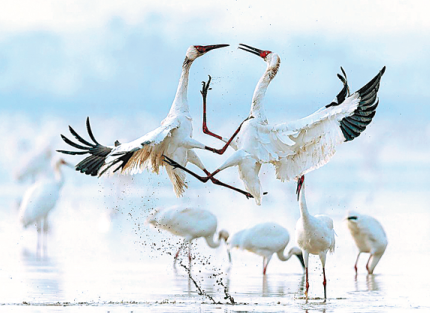
 Siberian white cranes have winter fun in Poyang Lake. XINHUA
Siberian white cranes have winter fun in Poyang Lake. XINHUA
"It's amazing. I've never seen real Siberian white cranes in my life. They don't seem to be afraid of people at all," says Iuliia.
In 2017, Zhou Haiyan, a shutterbug, together with many bird lovers, launched the Retaining the Siberian Crane initiative to build the country's first privately funded Siberian crane sanctuary that combines the functions of scientific research, education and photography.
Zhou has been dubbed by Russian media as the "Chinese mother of Siberian cranes".
Reputed as "man's closest place to Siberian cranes", the sanctuary usually attracts thousands of cranes during the peak period.
"China and Russia have been strengthening the protection mechanism for Siberian cranes," says Xu Zhiwen, head of the Jiangxi Poyang Lake National Nature Reserve Administration, adding that the administration in December signed a memorandum of understanding on strategic cooperation with Russia's Kytalyk National Park for better protecting and monitoring the birds.
According to Maria Vladimirtseva, a senior research fellow at the Russian park, the 1.8-million-hectare park is home to about 70 percent of the world's Siberian crane population.
"Migration is a very difficult and critical time in the life of crane birds, during which they face many dangers, especially for young birds," says Vladimirtseva. "During this process, the Russian and Chinese staff communicate with each other every day, informing each other of all the movements of the cranes on the flight path."
"The signing of the MoU allows us to make more efforts with Chinese colleagues. It is very important to make population statistics, and such work is relatively convenient in Poyang Lake, but impossible on the frozen ground," says Sergei Sleptsov, a research fellow at the Institute for Biological Problems of Cryolithozone of the Siberian Branch of the Russian Academy of Sciences.
"The birds know first whether the ecology is good or not," says Dai Nianhua, a researcher at the Jiangxi Academy of Sciences. "They are like 'ecological test paper' for the environment, and China and Russia have managed to expand and improve their habitats."